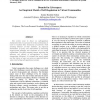Free Online Productivity Tools
i2Speak
i2Symbol
i2OCR
iTex2Img
iWeb2Print
iWeb2Shot
i2Type
iPdf2Split
iPdf2Merge
i2Bopomofo
i2Arabic
i2Style
i2Image
i2PDF
iLatex2Rtf
Sci2ools
HICSS
2005
IEEE
2005
IEEE
Bounded in Cyberspace: An Empirical Model of Self-Regulation in Virtual Communities
This article aims to focus on self-regulation mechanisms that are exercised by virtual communities in order to maintain their boundaries of autonomy while directing behavior of their members. An empirical examination of policy and enforcement of discarding inappropriate messages was conducted on 715 virtual communities. The study extracted lessons regarding the efficiency and efficacy of self-regulation in virtual communities. Moreover, it is argued that social capital and the history of users can serve as important factors while constructing self-regulation processes.
Biometrics | HICSS 2005 | Self-regulation Mechanisms | Study Extracted Lessons | System Sciences | Virtual Communities |
| Added | 24 Jun 2010 |
| Updated | 24 Jun 2010 |
| Type | Conference |
| Year | 2005 |
| Where | HICSS |
| Authors | Karine Barzilai-Nahon, Seev Neumann |
Comments (0)

